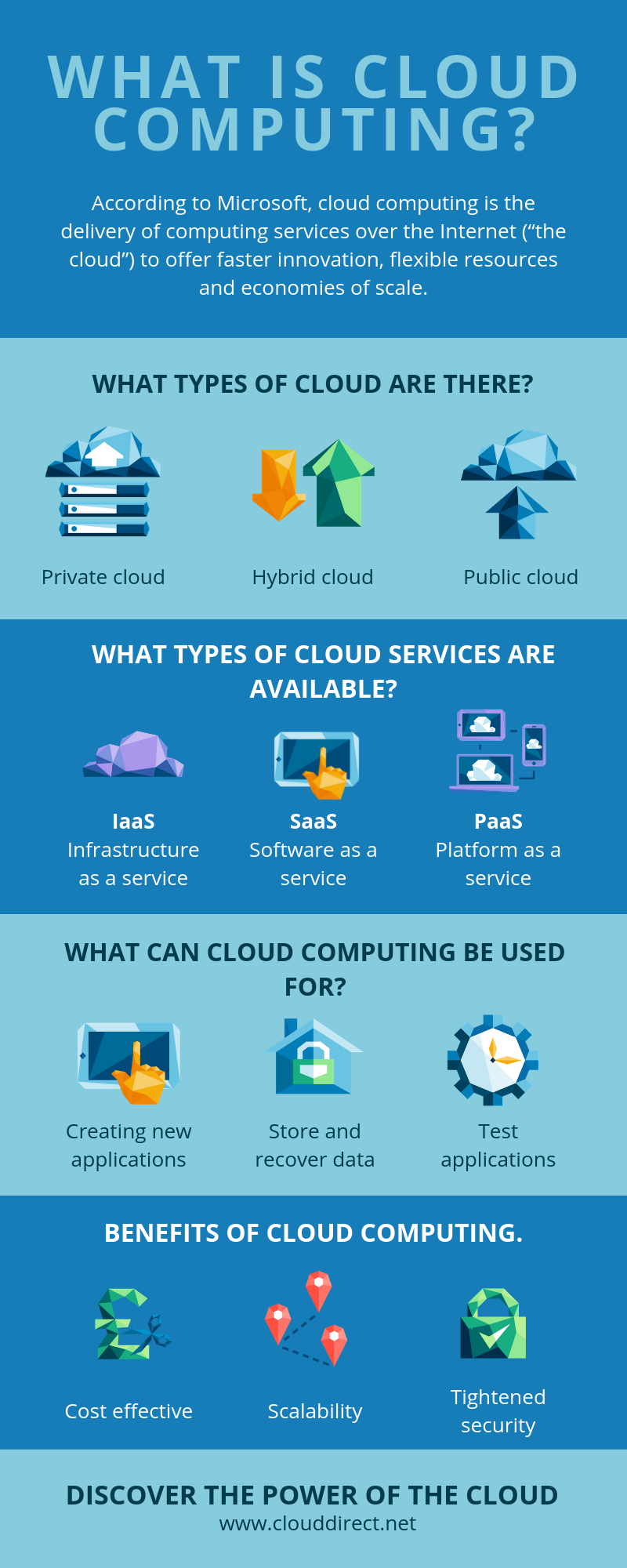What is cloud computing?

According to Microsoft, cloud computing is the delivery of computing services – including servers, storage, databases, networking, software, analytics and intelligence – over the Internet (“the cloud”) to offer faster innovation, flexible resources and economies of scale.
Source: https://azure.microsoft.com/en-gb/overview/what-is-cloud-computing/
What types of cloud are there?
There are three key cloud deployment models which depending on your business’s needs will determine what model would best suit you.
The three types of cloud include:
- Private Cloud: A private cloud is a cloud environment that has been exclusively created and owned by a business. You’ll have the option to locate your private cloud in the businesses on-site data centre, or even ask a third-party to host it for you. All private clouds infrastructure and services are managed on a private network.
- Public Cloud: On the other hand, public clouds are operated by third-party cloud service providers such as Microsoft Azure. The third-party provider will offer their services e.g. storage over the internet, and management of all your hardware, software and other supporting infrastructure. You’ll have the ability to manage your services through your web browser.
- Hybrid Cloud: Hybrid clouds are a perfect combination of public and private clouds that are brought together by technology, allowing your applications and data to be shared between the two. A hybrid cloud environment provides your business with more flexibility and will help optimise your current infrastructure, security and compliance. Meaning you’ll get the best of both worlds.
What types of cloud services are available?
The possibilities on the cloud are endless. There are three main cloud computing services, Infrastructure-as-a-Service (IaaS), Software-as-a-Service (SaaS) and Platform-as-a-Service (PaaS). But what are these services and how are they different from each other?
- Infrastructure as a Service (IaaS) is the core category of cloud services. IaaS is rented IT infrastructure from a third-party cloud provider. Within your IT infrastructure, you will be able to rent servers, network, storage, virtual machines and more.
- Platform as a Service (PaaS) is a cloud computing service that offers an environment for you to develop, test, deliver and manage your software applications with ease. With PaaS, it has never been easier for developers to create applications without having to worry about the setup of your underlying IaaS, storage, network and databases needed for development.
- Software as a Service (SaaS) is a method for delivering your software applications over the internet. This would be offered as an on–demand service on a subscription basis. Your cloud provider will host and manage the software application and infrastructure. They will also take care of any maintenance e.g. software upgrades or any security patching that’s needed. You can connect to the applications over the Internet via your browser on your PC, phone or tablet.
What can cloud computing be used for?
The cloud is more powerful than ever, and it’s quickly become a part of our daily lives. It allows you to access data, services, emails and documents from any location on any device. The first cloud computing services are barely a decade old, and businesses across all industries and sizes are embracing the cloud for different reasons. Some of these include:
- Ability to create new apps. The cloud provides you with the opportunity to build, deploy and scale applications with ease, whether they’re for web or mobile.
- Store and recover data. The cloud will help you protect your data at a more cost–effective price whilst keeping it accessible from any location and device. It will simply transfer your data from the internet to an offsite cloud storage system.
- Software as a service (SaaS) allows you to provide customers with your latest software updates no matter where they are.
- Test and build applications in the cloud. This will allow you to easily scale your applications up or down using your cloud infrastructure.
- Analyse your data across the different teams and locations within the cloud. You can make the most of machine learning and AI in the cloud to help you gain new insights to make smart decisions.
And the list goes on. The possibilities are endless with the cloud.
Benefits of cloud computing
41.9% of UK companies have adopted some form of cloud service. And this percentage is still rising. Why? Because there are many benefits of using cloud computing in an organisation. Here are six reasons why companies like yours are using the cloud.
- Cost effective. Cloud computing will eliminate the cost of purchasing hardware, software and running on-site data centres. Moving your IT to the cloud will not only be more efficient but will allow you to save on the costs.
- Scalability. Using cloud computing in your organisation will allow your business to achieve fearless growth. You’ll have the ability to scale your business on a global scale by adjusting your resources as and when you need it.
- Tightened security. Many cloud providers offer a set of policies that can keep your data, apps and infrastructure from any security threats.
- Speed. Most cloud services are provided over the internet as an on–demand self–service. Resulting in you having the ability to access your resources in a few mouse clicks.
- Increased productivity. On-site data centres need a lot of looking after with all the hardware setup and software patching. Cloud computing removes a lot of these tasks, allowing your IT team to focus on achieving your business goals.
- Reliability. Data backup, disaster recovery and business continuity are made easier with cloud computing.
“We’ve taken a big step forward in terms of flexibility with the Microsoft Cloud. Our staff can access our applications from any site or location. Whenever we need to provide access for any other site, the process is seamless.”
Jason Moon, Head of IT, Simarco

Cloud providers
There are plenty of Cloud providers out there. But it’s important you partner up with a provider that’s aligned with your business’s needs. So, are you thinking of migrating to the cloud, but unsure of what cloud provider to go with? Microsoft Azure is one of the biggest cloud providers in the UK and will help your business unlock its full potential. If you would like to discover the power of the cloud, then sign up to one of our Azure Roadshows.
Cloud Direct was born in the cloud, and we’ve helped over numerous companies migrate to the cloud, so it’s safe to say we know a thing or two. We have a team of cloud experts that can provide you with more information on the cloud. Simply get in contact today and a member of our team will get in touch with you shortly.
We have a team of experts that can answer all your questions about the Microsoft cloud. Simply get in contact today and a member of our team will be in touch with you shortly.


